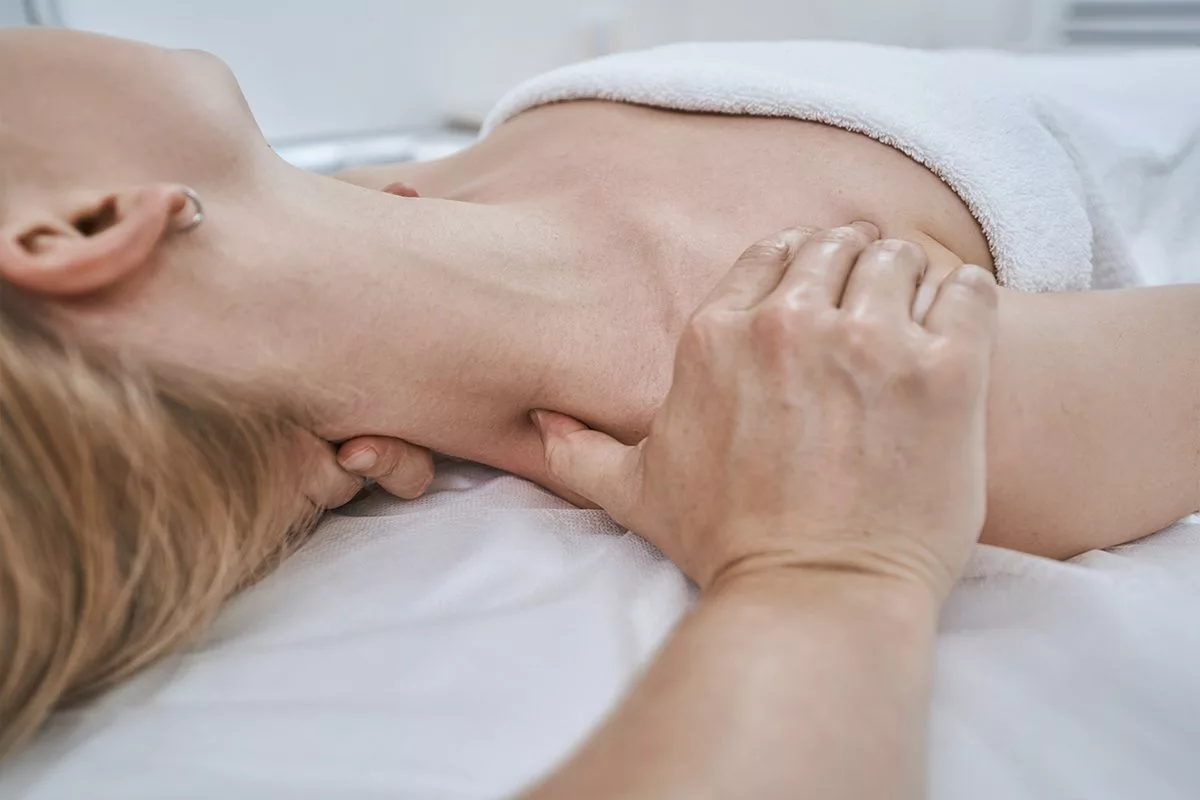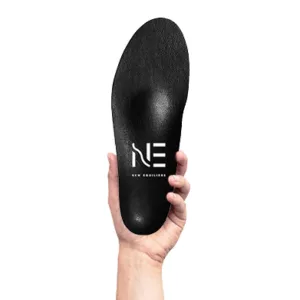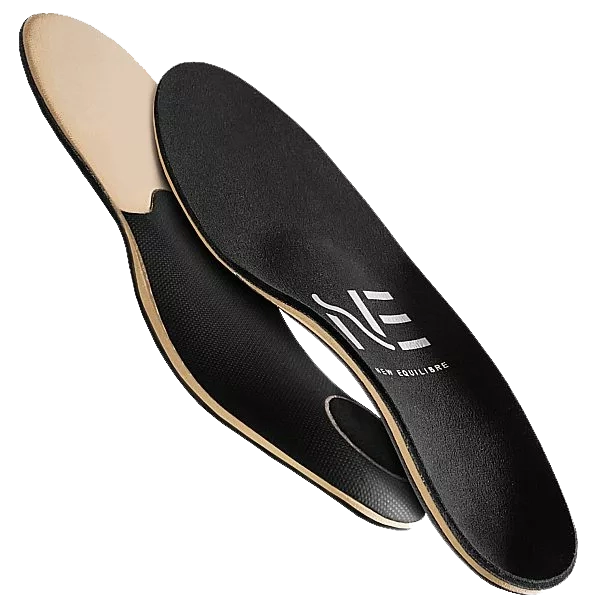Cervicalgia
the complete guide
- Published on
- By New Equilibre
Cervicalgia, commonly known as cervicalgia, is a common complaint affecting many people at some point in their lives.
They can be caused by a variety of factors, such as muscular tension, trauma, postural disorders or joint problems. Although often temporary, neck pain can sometimes become chronic, affecting quality of life and well-being.

In this article, we'll explore in detail what neck pain is, its symptoms, ways to relieve pain, the use of orthopedic inserts as a treatment option, health professionals to consult, the typical duration of cervicalgia and preventive measures to avoid this pain.
What is cervicalgia?
Cervicalgia, commonly known as neck pain, is localized pain in the neck area. They can be caused by a variety of factors, including muscular tension, trauma, joint problems or postural disorders. Cervicalgia can be acute, occurring suddenly and usually disappearing within a few days, or chronic, persisting for several weeks or months.
What are the symptoms of cervicalgia?
Symptoms of cervicalgia can vary depending on the underlying cause and the severity of the condition. Here's a more detailed description of the most common symptoms:
Pain in the neck and nape area: Pain is often experienced as a sensation of stiffness, tension or stabbing pain localized to the neck and base of the skull. This pain can range from mild to severe, and may be exacerbated by neck movement.
Muscle stiffness: Neck muscles can become tight and stiff in response to pain, which can limit neck mobility and make tilting or turning the head difficult or painful.
Headaches: Neck pain can be associated with headaches, particularly tension headaches, which manifest as a feeling of pressure or tightness around the head.
Vertigo: Some individuals with cervicalgia may experience vertigo or a feeling of imbalance, particularly when moving their head or changing position rapidly.
Tingling or numbness: Cervical pain can lead to tingling or numbness in the arms, shoulders or hands. This may indicate irritation or compression of the cervical nerves that emerge from the spine.
Difficulty turning or tilting the head: Due to pain and muscle stiffness, it can be difficult for some people to turn or tilt the head in certain directions, which can limit their mobility and daily function.
It's important to note that symptoms can vary from person to person and can be influenced by other factors such as age, general health and daily activities. If you are experiencing symptoms of neck pain, it is recommended that you consult a healthcare professional for an accurate diagnosis and appropriate treatment plan.
How can I relieve cervicalgia?
When cervical pain strikes, finding effective relief becomes a priority. Fortunately, there are several approaches to relieving this pain, ranging from drug treatments to natural methods to the use of orthopedic devices such as insoles. Let's discover the different options available to relieve cervical pain and improve quality of life.
Drug treatments
To relieve cervical pain, non-steroidal anti-inflammatory drugs (NSAIDs) such as ibuprofen or paracetamol may be prescribed to reduce inflammation and relieve pain. Muscle relaxants may also be recommended to relax neck muscles and relieve tension.
Natural treatments
In addition to drug treatments, natural approaches can also be effective in relieving cervical pain. Rest, the application of hot or cold compresses, therapeutic massage, physiotherapy and relaxation techniques such as yoga or meditation can help relax neck muscles and relieve pain.
Orthopedic insoles to relieve cervicalgia
Orthotics can also help relieve neck pain by correcting postural imbalances and providing adequate support for the spine. By improving body alignment and reducing pressure on neck joints, orthotics can help reduce muscle tension and prevent neck pain.
Their thermoformed shape provides perfect support for your entire foot, supporting your inner, outer and anterior plantar arches, increasing your weight-bearing surface to 100%. These supports rebalance your posture correctly, limiting low-back and cervicalgia as well as plantar pain.
New Equilibre insoles have been tested and approved by thousands of users. Their effectiveness is clinically proven. It's easy to order your insoles exclusively from our online store, and regain the comfort your feet deserve.
Free delivery to Metropolitan France, within 2 working days. Free returns within 14 days.
Who should you see if you have cervicalgia?
When you're experiencing neck pain, there are a number of healthcare professionals who can help you find relief and treat the underlying cause of your neck pain. Here's a list of professionals you can consult in detail:
General practitioner: Your general practitioner is often the first healthcare professional to consult in the event of neck pain. He or she can assess your symptoms, perform a physical examination and ask questions about your medical history to determine the possible cause of your neck pain. He can also prescribe medication and recommend self-care measures or conservative therapies.
Orthopedist: An orthopedist is a doctor who specializes in treating musculoskeletal problems, including neck pain. He or she may perform more in-depth examinations, such as X-rays or MRIs, to assess the structure of your neck and determine the underlying cause of your pain. Depending on the diagnosis, he or she may recommend conservative treatments such as physiotherapy, injections or surgical options if necessary.
Physiotherapist: A physiotherapist is a healthcare professional specializing in the rehabilitation and recovery of musculoskeletal injuries. He or she can develop a specific exercise program to strengthen neck muscles, improve mobility and reduce neck pain. The physiotherapist may also use manual therapy techniques, stretching and treatment modalities such as ultrasound or laser therapy to relieve pain.
Chiropractor: A chiropractor is a healthcare professional who specializes in the treatment of musculoskeletal disorders, including neck pain. He or she may use chiropractic adjustments to realign the spine, reduce muscle tension and improve neck mobility. The chiropractor may also recommend strengthening exercises and preventive measures to avoid recurrence.
Osteopath: An osteopath is a healthcare professional who focuses on soft-tissue and joint manipulation to relieve pain and restore function. He or she may use gentle manual techniques to treat neck pain, such as joint manipulation, stretching and soft-tissue mobilization.
Neurologist: If your neck pain is associated with neurological symptoms such as numbness, tingling or weakness in the arms or legs, your doctor may refer you to a neurologist for further evaluation. The neurologist can perform specialized tests to assess nerve function and determine the underlying cause of your symptoms.
Depending on the severity of your symptoms and the likely cause of your cervical pain, your health-care professional may recommend that you consult one of these professionals, or that you consult them together for a comprehensive, personalized treatment plan. It's important to seek medical attention if your neck pain is severe, persists for more than a few days or is associated with neurological symptoms such as numbness, tingling or weakness in the arms or legs.
How long does cervicalgia last?
The duration of cervicalgia can vary depending on the underlying cause and the severity of symptoms. In most cases, acute neck pain disappears within a few days to a few weeks with self-care measures and appropriate treatment. However, chronic neck pain can persist for weeks, months or even years, often requiring long-term management to relieve symptoms.
How to avoid cervicalgia?
To avoid cervicalgia and keep your neck healthy, here are some detailed tips :
Adopt good posture: Maintain correct posture at all times, whether you're sitting, standing or moving. Avoid tilting your head forward for long periods, and keep your shoulders relaxed and in line with your ears.
Avoid prolonged positions: Avoid staying in one position for long periods, whether sitting in front of a computer, standing or driving. Take regular breaks to move around, stretch your neck and rest your muscles.
Practice strengthening and stretching exercises: Strengthen your neck and back muscles by regularly practicing specific muscle-strengthening exercises. In addition, stretch to keep your neck muscles and joints supple.
Use an ergonomic pillow: Choose a pillow that properly supports your head and neck when you sleep. An ergonomic pillow can help maintain the natural curve of your cervical spine and reduce muscle tension during sleep.
Adjust your workstation: If you work in front of a computer, make sure your workstation is properly set up to promote proper posture. Adjust the height of your chair, desk and monitor to keep your neck in a neutral position.
Limit sudden neck movements: Avoid sudden or excessive neck movements that could lead to muscle tension or injury. When turning or tilting the head, do so slowly and gently to avoid unnecessary tension.
Watch out for your backpack: If you're carrying a backpack, make sure it fits snugly and distributes the weight evenly over your shoulders. Avoid carrying bags that are too heavy, which can put excessive strain on your neck and shoulders.
Stay active and maintain a healthy weight: Maintaining an active lifestyle and keeping a healthy weight can help reduce the risk of developing neck pain by strengthening neck and back muscles and reducing pressure on the spine.
By following these tips and adopting good postural habits on a daily basis, you can reduce the risk of developing neck pain and maintain the long-term health of your neck. If you have any questions or concerns about your neck, don't hesitate to consult a healthcare professional for personalized advice.

New Equilibre
Healthcare professionals specializing in the manufacture of orthopedic insoles for over 30 years. Clinically proven expertise with thousands of New Equilibre users and patients in orthopedic practices.

